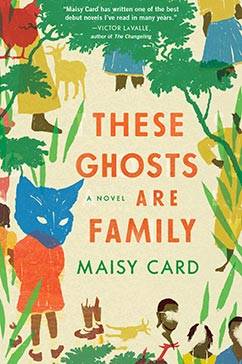New Book by Author Maisy Card Discusses Racism in America
Professors Jennifer Brice and Kezia Page virtually welcomed author Maisy Card to the Colgate campus to read from her new novel These Ghosts Are Family on Thursday, Nov. 5. Spanning from Jamaica to New York City, Card’s protagonists experience racism in America through their own legacy of colonialism.
Card’s unique writing style allows her to inhabit the consciousness of many different characters. Switching between first, second and third person, Card utilizes these different perspectives to fully explore all aspects of her characters’ identities and their experiences in America. Given the intimacy in Card’s writing of each character, audience members wondered about her inspiration to write with such fluidity between narrators.
“These characters are fictional, but in my mind, I thought of them as family. There is a certain freedom for a fiction writer to shape-shift in the minds of all of these characters,” Card said.
A story full of violence, trauma and heartbreak, Card’s novel recounts moments of confrontation and love between Jamaican immigrants while reflecting on their time back in their homeland. During her reading, Card focused on the chapter which depicts Vera, a Jamaican woman, in distress upon being accused of demonic possession by her neighbors and friends, a product of her drastic depressive episodes. Performing an exorcism, some characters timidly recite prayers while her son attempts to free Vera from what amounts to inhumane torture. This trauma, along with other scenes of violence, stay with the main characters throughout the novel and deeply influence their life choices.
Writing scenes bursting with tension, betrayal and grief, Card told the audience that she was especially interested in writing characters that had to deal with intense confrontation. While Card claimed that she is not a confrontational person, she explained that her strongest writing stemmed from exploring confrontational scenarios.
“I like to think about what it takes for people to get that courage to confront somebody — to go beyond their own fear and speak or confront whoever has caused them trauma,” Card said.
Despite the dark undertones of the novel’s plot, Card manages to sprinkle humor into her writing. Card attributes the joking sarcasm between women in the novel to her experiences growing up around Jamaican women.
“My family talks about death very openly. Those dinner table discussions with my family and my aunts — I think I definitely channeled that energy into my writing because I am not naturally a humorous person,” Card said.
Along with this familial inspiration, Card’s writing was also significantly influenced by her time spent in libraries. As a librarian and author, Card was able to use her library’s resources to increase the historical accuracy of her plot surrounding immigrants coming to New York City and life as a slave. Beyond their value to research, Card reflected on the magic of libraries.
“Libraries are one of the few places left in society where you can go and not spend any money. It is egalitarian. There are people from all walks of life; hearing these stories is very exciting for a writer to see how others feel and interpret the world,” Card said.
From her own experiences of traveling to Jamaica to listening to the stories of other immigrants, Card hoped to create an authentic story about loss, trauma and the implications of racism and colonialism in America. Speaking fondly of her childhood memories, Card recognized her own privilege of growing up in Brooklyn and avoiding the decades of abuse her ancestors endured. Through her writing, Card connected with and paid homage to all of the untold stories of Jamaican immigrants and their struggles entering a new world.









